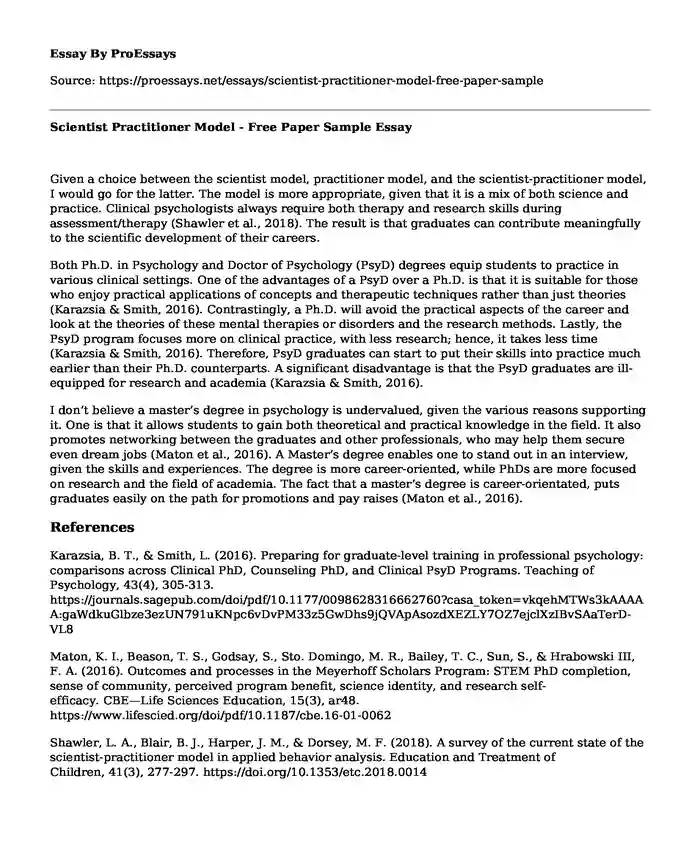Given a choice between the scientist model, practitioner model, and the scientist-practitioner model, I would go for the latter. The model is more appropriate, given that it is a mix of both science and practice. Clinical psychologists always require both therapy and research skills during assessment/therapy (Shawler et al., 2018). The result is that graduates can contribute meaningfully to the scientific development of their careers.
Both Ph.D. in Psychology and Doctor of Psychology (PsyD) degrees equip students to practice in various clinical settings. One of the advantages of a PsyD over a Ph.D. is that it is suitable for those who enjoy practical applications of concepts and therapeutic techniques rather than just theories (Karazsia & Smith, 2016). Contrastingly, a Ph.D. will avoid the practical aspects of the career and look at the theories of these mental therapies or disorders and the research methods. Lastly, the PsyD program focuses more on clinical practice, with less research; hence, it takes less time (Karazsia & Smith, 2016). Therefore, PsyD graduates can start to put their skills into practice much earlier than their Ph.D. counterparts. A significant disadvantage is that the PsyD graduates are ill-equipped for research and academia (Karazsia & Smith, 2016).
I don’t believe a master’s degree in psychology is undervalued, given the various reasons supporting it. One is that it allows students to gain both theoretical and practical knowledge in the field. It also promotes networking between the graduates and other professionals, who may help them secure even dream jobs (Maton et al., 2016). A Master’s degree enables one to stand out in an interview, given the skills and experiences. The degree is more career-oriented, while PhDs are more focused on research and the field of academia. The fact that a master’s degree is career-orientated, puts graduates easily on the path for promotions and pay raises (Maton et al., 2016).
References
Karazsia, B. T., & Smith, L. (2016). Preparing for graduate-level training in professional psychology: comparisons across Clinical PhD, Counseling PhD, and Clinical PsyD Programs. Teaching of Psychology, 43(4), 305-313. https://journals.sagepub.com/doi/pdf/10.1177/0098628316662760?casa_token=vkqehMTWs3kAAAAA:gaWdkuGlbze3ezUN791uKNpc6vDvPM33z5GwDhs9jQVApAsozdXEZLY7OZ7ejclXzIBvSAaTerD-VL8
Maton, K. I., Beason, T. S., Godsay, S., Sto. Domingo, M. R., Bailey, T. C., Sun, S., & Hrabowski III, F. A. (2016). Outcomes and processes in the Meyerhoff Scholars Program: STEM PhD completion, sense of community, perceived program benefit, science identity, and research self-efficacy. CBE—Life Sciences Education, 15(3), ar48. https://www.lifescied.org/doi/pdf/10.1187/cbe.16-01-0062
Shawler, L. A., Blair, B. J., Harper, J. M., & Dorsey, M. F. (2018). A survey of the current state of the scientist-practitioner model in applied behavior analysis. Education and Treatment of Children, 41(3), 277-297. https://doi.org/10.1353/etc.2018.0014
Cite this page
Scientist Practitioner Model - Free Paper Sample. (2024, Jan 09). Retrieved from https://proessays.net/essays/scientist-practitioner-model-free-paper-sample
If you are the original author of this essay and no longer wish to have it published on the ProEssays website, please click below to request its removal:
- Analysis of Fictional Show "13 Reasons Why"
- Essay Sample on Spiritual Care
- America's Pursuit of Happiness Essay
- MSI Form Description Paper Example
- Essay on Understanding Team Members' Behaviors for Optimal Group Performance
- Paper Example on Recruiting and Developing Competent Leaders: Key to Institutional Success
- Thomas Graham: Pioneering Chemistry through Graham's Law of Diffusion and Scientific Contributions - Free Paper







